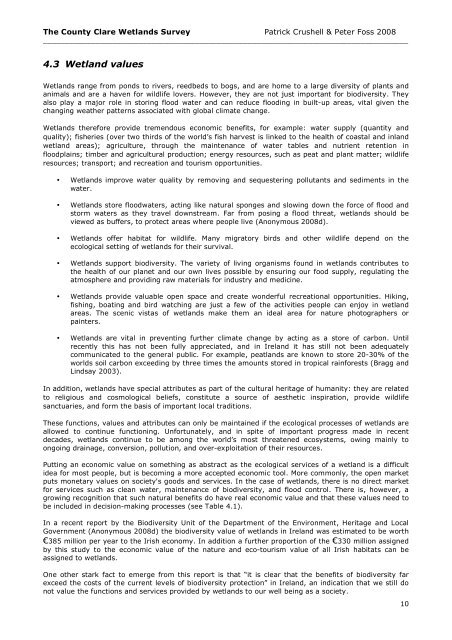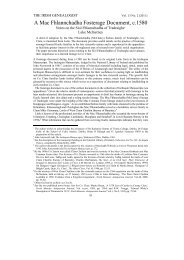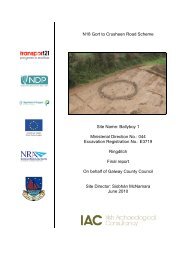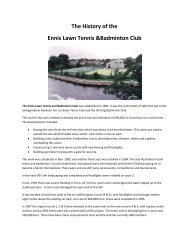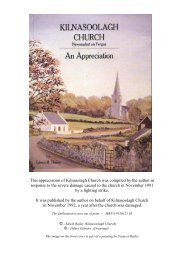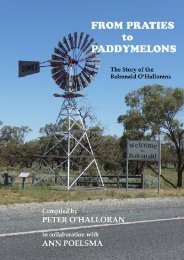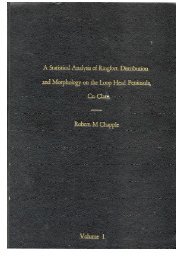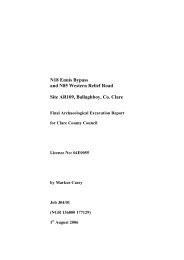Report Cover Vol I - Clare County Library
Report Cover Vol I - Clare County Library
Report Cover Vol I - Clare County Library
You also want an ePaper? Increase the reach of your titles
YUMPU automatically turns print PDFs into web optimized ePapers that Google loves.
The <strong>County</strong> <strong>Clare</strong> Wetlands Survey Patrick Crushell & Peter Foss 2008<br />
____________________________________________________________________________________<br />
4.3 Wetland values<br />
Wetlands range from ponds to rivers, reedbeds to bogs, and are home to a large diversity of plants and<br />
animals and are a haven for wildlife lovers. However, they are not just important for biodiversity. They<br />
also play a major role in storing flood water and can reduce flooding in built-up areas, vital given the<br />
changing weather patterns associated with global climate change.<br />
Wetlands therefore provide tremendous economic benefits, for example: water supply (quantity and<br />
quality); fisheries (over two thirds of the world’s fish harvest is linked to the health of coastal and inland<br />
wetland areas); agriculture, through the maintenance of water tables and nutrient retention in<br />
floodplains; timber and agricultural production; energy resources, such as peat and plant matter; wildlife<br />
resources; transport; and recreation and tourism opportunities.<br />
• Wetlands improve water quality by removing and sequestering pollutants and sediments in the<br />
water.<br />
• Wetlands store floodwaters, acting like natural sponges and slowing down the force of flood and<br />
storm waters as they travel downstream. Far from posing a flood threat, wetlands should be<br />
viewed as buffers, to protect areas where people live (Anonymous 2008d).<br />
• Wetlands offer habitat for wildlife. Many migratory birds and other wildlife depend on the<br />
ecological setting of wetlands for their survival.<br />
• Wetlands support biodiversity. The variety of living organisms found in wetlands contributes to<br />
the health of our planet and our own lives possible by ensuring our food supply, regulating the<br />
atmosphere and providing raw materials for industry and medicine.<br />
• Wetlands provide valuable open space and create wonderful recreational opportunities. Hiking,<br />
fishing, boating and bird watching are just a few of the activities people can enjoy in wetland<br />
areas. The scenic vistas of wetlands make them an ideal area for nature photographers or<br />
painters.<br />
• Wetlands are vital in preventing further climate change by acting as a store of carbon. Until<br />
recently this has not been fully appreciated, and in Ireland it has still not been adequately<br />
communicated to the general public. For example, peatlands are known to store 20-30% of the<br />
worlds soil carbon exceeding by three times the amounts stored in tropical rainforests (Bragg and<br />
Lindsay 2003).<br />
In addition, wetlands have special attributes as part of the cultural heritage of humanity: they are related<br />
to religious and cosmological beliefs, constitute a source of aesthetic inspiration, provide wildlife<br />
sanctuaries, and form the basis of important local traditions.<br />
These functions, values and attributes can only be maintained if the ecological processes of wetlands are<br />
allowed to continue functioning. Unfortunately, and in spite of important progress made in recent<br />
decades, wetlands continue to be among the world’s most threatened ecosystems, owing mainly to<br />
ongoing drainage, conversion, pollution, and over-exploitation of their resources.<br />
Putting an economic value on something as abstract as the ecological services of a wetland is a difficult<br />
idea for most people, but is becoming a more accepted economic tool. More commonly, the open market<br />
puts monetary values on society's goods and services. In the case of wetlands, there is no direct market<br />
for services such as clean water, maintenance of biodiversity, and flood control. There is, however, a<br />
growing recognition that such natural benefits do have real economic value and that these values need to<br />
be included in decision-making processes (see Table 4.1).<br />
In a recent report by the Biodiversity Unit of the Department of the Environment, Heritage and Local<br />
Government (Anonymous 2008d) the biodiversity value of wetlands in Ireland was estimated to be worth<br />
€385 million per year to the Irish economy. In addition a further proportion of the €330 million assigned<br />
by this study to the economic value of the nature and eco-tourism value of all Irish habitats can be<br />
assigned to wetlands.<br />
One other stark fact to emerge from this report is that “it is clear that the benefits of biodiversity far<br />
exceed the costs of the current levels of biodiversity protection” in Ireland, an indication that we still do<br />
not value the functions and services provided by wetlands to our well being as a society.<br />
10


